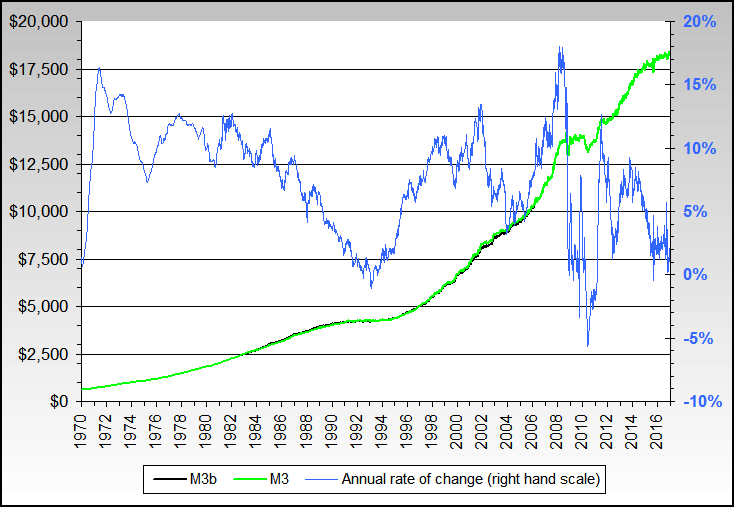
Problemen met registreren of reageren op de berichten?
Een verloren wachtwoord?
Gelieve een mail te zenden naar [email protected] met vermelding van je gebruikersnaam.
 |
Registreren kan je hier. Problemen met registreren of reageren op de berichten? Een verloren wachtwoord? Gelieve een mail te zenden naar [email protected] met vermelding van je gebruikersnaam. |
|
|||||||
| Registreer | FAQ | Forumreglement | Ledenlijst | Markeer forums als gelezen |
| Economie Hier kan je discussiëren over economie en staatsschuld |
 |
|
|
Discussietools |
|
|
#1 |
|
Secretaris-Generaal VN
Geregistreerd: 26 september 2003
Locatie: van Lissabon tot Vladivostok
Berichten: 31.221
|
__________________
Doorzoek forum.politics.be (aangepaste zoekmachine) |
|
|

|
|
|
#2 |
|
Secretaris-Generaal VN
Geregistreerd: 26 september 2003
Locatie: van Lissabon tot Vladivostok
Berichten: 31.221
|
Tweede vraag:
Hoeveel procent bedraagt de groei van de M3-geldhoeveelheid? Wat betekent dit cijfer in verhouding tot de twee vorige? Waar gaat de groei van de monetaire massa heen?
__________________
Doorzoek forum.politics.be (aangepaste zoekmachine) |
|
|

|
|
|
#3 |
|
Gouverneur
Geregistreerd: 24 maart 2008
Berichten: 1.091
|
-het artikel heeft het over wholesale inflation, dit is echter niet de inflatie waar centrale banken rekening mee houden. Wholesale prijzen zijn de prijzen waar bedrijven en retailers mee te maken krijgen, maar niet de prijzen die consumenten zien.
-CPI en core inflation is betrekkelijk lager. |
|
|

|
|
|
#4 | |
|
Secretaris-Generaal VN
Geregistreerd: 26 september 2003
Locatie: van Lissabon tot Vladivostok
Berichten: 31.221
|
Citaat:
PPI = producer price index "A family of indexes that measures the average change in selling prices received by domestic producers of goods and services over time. PPIs measure price change from the perspective of the seller." Wat men produceert komt uiteindelijk bij de consument terecht.
__________________
Doorzoek forum.politics.be (aangepaste zoekmachine) |
|
|
|

|
|
|
#5 |
|
Parlementsvoorzitter
Geregistreerd: 7 maart 2008
Berichten: 2.035
|
De Amerikaanse overheid heeft inflatie nodig om haar enorm deficiet af te wentelen op haar burgers, zonder officieel de belastingen te moeten verhogen.
|
|
|

|
|
|
#6 | |
|
Secretaris-Generaal VN
Geregistreerd: 26 september 2003
Locatie: van Lissabon tot Vladivostok
Berichten: 31.221
|
 LT-evolutie van de M3-groei: Grafiek Citaat:
Federale bank intrestvoet 2% PPI inflatie index rond de 10%
__________________
Doorzoek forum.politics.be (aangepaste zoekmachine) |
|
|
|

|
|
|
#7 | |
|
Gouverneur
Geregistreerd: 24 maart 2008
Berichten: 1.091
|
Citaat:
Hogere producentenprijzen zullen waarschijnlijk uiteindelijk wel bij de consumenten terechtkomen, maar dat is nu nog niet vermits de momenteel CPI niet zoveel stijgt als de PPI. Iedere stijging van PPI hoeft ook niet altijd volledig doorgerekend worden in CPI. Mss raken US bedrijven weg met een grotere PPI door de exporteren? De daling van de dollar maakt dit mogelijk. |
|
|
|

|
|
|
#8 | ||
|
Gouverneur
Geregistreerd: 24 maart 2008
Berichten: 1.091
|
Citaat:
Citaat:
|
||
|
|

|
|
|
#9 |
|
Secretaris-Generaal VN
Geregistreerd: 7 december 2004
Locatie: Vlaanderen
Berichten: 21.732
|
Mja, gezellig is anders. Nu ja, de inflatie zal wel ergens stoppen (hoop ik).
|
|
|

|
|
|
#10 |
|
Parlementsvoorzitter
Geregistreerd: 7 maart 2008
Berichten: 2.035
|
Dat weet ik zo nog niet, de Amerikaanse regering (en nog een aantal anderen) zijn wanhopig aan het worden over hun schuldenberg. Ze kunnen niet meer rechtstreekse belastingen opleggen omdat ze weten dat dit de economische groei zwaar fnuikt (trouwens een situatie die wij hier in België ook hebben). Bijgevolg moeten ze het e.e.a. ergens anders mee financieren en dan is inflatie wel heel handig. De FED wordt hierbij volgens mij onder druk gezet, waardoor de FED redeneert dat economische groei belangrijker is dan de bestrijding van inflatie... Dit is ongeveer hetzelfde als finaal landen als Zimbabwe in de miserie gewerkt heeft.
Reken er nog bij dat grote economische blokken dollars als reserve hebben dan is het wel erg handig om ook die landen hun dollarpotentieel aan te tasten... Ben nog niet helemaal uit de situatie met de handelsbalansen, maar ook daar lijkt mij een voordeel voor een devaluatie te zitten. Laatst gewijzigd door Yves38 : 17 juli 2008 om 17:51. |
|
|

|
|
|
#11 |
|
Secretaris-Generaal VN
Geregistreerd: 26 september 2003
Locatie: van Lissabon tot Vladivostok
Berichten: 31.221
|

==> M3 = the broadest measure It is used by economists
__________________
Doorzoek forum.politics.be (aangepaste zoekmachine) |
|
|

|
|
|
#12 |
|
Secretaris-Generaal VN
Geregistreerd: 26 september 2003
Locatie: van Lissabon tot Vladivostok
Berichten: 31.221
|
Hier kun je wat meer uitleg vinden: ECB
Referentiewaarde voor de groei van de monetaire massa M3 = 4,5% Referentiewaarde prijsstabiliteit = 2% (geharmoniseerde consumptieprijsindex voor het eurogebied) Actuele waarden voor de eurozone:
__________________
Doorzoek forum.politics.be (aangepaste zoekmachine) Laatst gewijzigd door Nr.10 : 17 juli 2008 om 21:46. |
|
|

|
|
|
#13 |
|
Parlementsvoorzitter
Geregistreerd: 7 maart 2008
Berichten: 2.035
|
Die grafieken vertonen toch opvallend veel overeenstemming met het ontstaan van overheidsdeficiet en lopen plots op vanaf het afschaffen van de goldstandard niet ?
|
|
|

|
|
|
#14 |
|
Perm. Vertegenwoordiger VN
Geregistreerd: 14 maart 2004
Berichten: 17.406
|
En toen werd alles stil...
__________________
De valse beloftes over NATO expansie van Westen aan Gorbachev. https://forum.politics.be/showthread.php?t=269743 Overheid: de bende deserteurs uit de economie. Lees dit en besef: http://achterdesamenleving.nl/wp-con...jgeloof-11.pdf Voor de speculant-spaarder: buy when negativism, and sell when positivism rules the propaganda. Niet omgekeerd. Atlas Shrugged, by Ayn Rand |
|
|

|
|
|
#15 | |
|
Secretaris-Generaal VN
Geregistreerd: 26 september 2003
Locatie: van Lissabon tot Vladivostok
Berichten: 31.221
|
Citaat:
Valt het afschaffen van de goudstandaard niet samen met de Vietnam-oorlog?
__________________
Doorzoek forum.politics.be (aangepaste zoekmachine) |
|
|
|

|